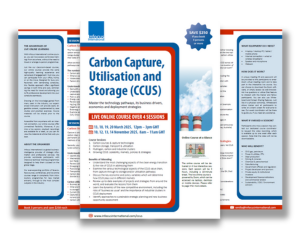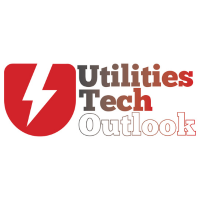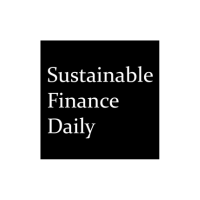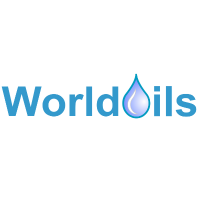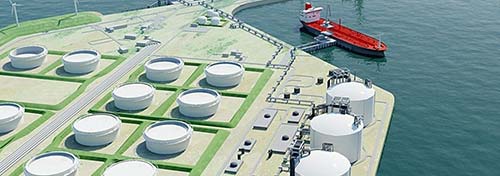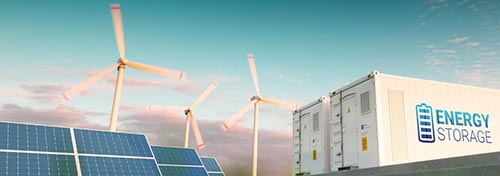Carbon Capture, Utilisation & Storage (CCUS) (Online Course)
WHEN
Commences: 10 November 2025
WHERE
Live Online Course
Overview
Master the technology pathways, its business drivers, economics and deployment strategies
This course is intended for those in business, commercial and strategically focused roles within the energy sector; in particular those responsible for environmental matters, business sustainability and business transformation in areas such as oil & gas, hydrogen and industrial energy usage.
You will leave with a clearly explained and independent perspective on how, where and why CCUS is happening now and could grow in future – covering the range of technological solutions and business drivers, including policy. In addition to reviewing existing CCUS approaches, the course will highlight new opportunities and integrated value creation possibilities through emerging carbon utilisation options. This will include how the fate of carbon capture links to other aspects of the clean energy transition, such as clean hydrogen production, industrial decarbonisation and the transition away from oil & gas.
Benefits of Attending
- Understand the most challenging aspects of the clean energy transition & the role of CCUS in addressing them
- Examine the various technological aspects of the CCUS value chain, from capture through to storage and/or utilisation pathways
- Discuss the key economic and policy variables which will determine how CCUS plays out in different markets
- Review up-to-date examples of projects and strategies from around the world, and evaluate the lessons from them
- Learn the dynamics of the new competitive environment, including the risks of ‘business as usual’ and the importance of industrial clusters in CCUS deployment
- Identify approaches to sustainable strategic planning and new business opportunity assessment
Live Online Course – How It Works
The structure of our virtual learning program is designed to keep the same levels of engagement and networking as our on-site public courses. Course content is delivered through our easy-to-use online learning platform and is supplemented by case studies and practical exercises.
Like our classroom-based public courses, you will have live interaction with our course facilitators and other participants. Our live online courses are led by our experienced instructors, who will provide you with easily digestible content, using knowledge learned from many years in the industry, during scheduled times. Delegates will receive copies of the course materials electronically.
This course is scheduled to take place over 4 live online sessions using virtual learning technology.
Course Agenda
Session 1: 10 November 2025, 8am – 11am GMT
Carbon Sources & Capture Technologies
This first session provides an essential contextual review and quantification of where carbon emissions are focused. You will then receive a comprehensive review and terminology-buster covering the various technological pathways towards carbon capture, their state of readiness and examples of their deployments on the ground and/or in planning.
What are the key barriers to carbon capture, how might they be overcome, and which pathways are likely to advance at the greatest pace?
- The numbers and trends around emitted and captured carbon dioxide
- Understanding carbon capture technologies
Session 2: 12 November 2025, 8am – 11am GMT
Carbon Storage, Transport & Utilisation
Capture is only the first stage of a challenging and lengthy supply chain in ensuring carbon stays out of the atmosphere. This session focuses firstly on the options for permanent underground sequestration of captured carbon dioxide, and the available methods of transporting it to those locations.
Secondly, you will learn about the alternative to storing carbon: using it. How is captured carbon currently utilised and which other uses are under development or consideration?
- Understanding carbon dioxide storage & transport
- Carbon utilisation
Session 3: 13 November 2025, 8am – 11am GMT
Hydrogen, Carbon & Industrial Clusters
The fate of CCUS may, in many regions, be strongly linked to that of another trending topic in the road to decarbonisation: clean hydrogen. Linkages between the two topics are particularly evident in three key areas: hydrogen production, carbon utilisation and industrial decarbonisation.
This session focuses on the synergies between clean hydrogen and CCS across all three of these topics. Can each exist without the other, or will the co-location of carbon and hydrogen value chains prove to be a key economic foundation for both?
- Blue hydrogen production
- Industrial decarbonisation pathways and clusters
Session 4: 14 November 2025, 8am – 11am GMT
Growing CCUS: Scalability, Markets, Policies & Strategies
The concepts of CCUS are not new and have been discussed for many years. Yet CCUS has never taken off on a scale that many once hoped.
What is different now and why is CCUS back at centre stage within energy transition discussions? Who is likely to drive new CCUS deployment and where are these projects most likely to happen? What are the risks that could make this another false dawn?
- Policy drivers & influences on CCUS
- Strategic & business model drivers for CCUS growth
Training Methodology
The course combines presented materials with plenty of opportunity for Q&A, interactive discussions, and the use of quantitative models to illustrate key learning points. Current market examples and data are utilised wherever helpful.

Pre-Course Questionnaire
We would like to customise the workshop based on your specific needs. Pre-Course Questionnaire will be sent prior to the workshop for analyse in advance and to be addressed during the course.

Course Certificate
Upon the successful completion of this course, you will receive a Certificate of Completion bearing the signatures from both the Course Director and the Course Organiser. This Certificate will testify your endeavour and serve towards your professional advancement.
Who Will Attend
- Oil & gas, petroleum
- Power & utilities, IPPs
- Steel production
- Mining & minerals
- Chemical & petrochemical
- Manufacturing
- Government officials and regulators
- Project developers and sponsors
- Private equity & institutional investors
- Development finance institutions and commercial lenders
- Sustainability / ESG / Environment advisors
You Might Also Be Interested In
LNG: Supply, Demand, Pricing and Trading (Online Course)
An overview of the LNG business in 2025 with a commercial focus but technology and shipping will also be covered
Dates: 9, 10, 11, 15, 17, 18 September 2025
Mastering Clean Ammonia (Online Course)
A business guide to ammonia production, market opportunities & deployment challenges
Dates: 14, 15, 16 October 2025
Mastering Solar Power (Online Course)
Building solar power into clean, modern & flexible power systems
Dates: 27, 28, 29, 30, 31 October 2025
Energy Storage (Online Course)
A business-focused assessment of energy storage opportunities, competing solutions and project delivery essentials
Dates: 17, 18, 19, 20 November 2025
EPC Contracts for Energy Industry (Online Course)
A comprehensive analysis of EPC contracts and of the key considerations in projects and disputes where such contracts are used
Dates: 17, 19, 20, 25, 26 November 2025
Mastering Clean Hydrogen (Online Course)
A comprehensive, participative course, providing the knowledge and tools to segment and analyse opportunity & risk within emerging hydrogen economies




